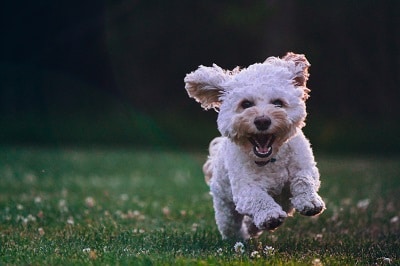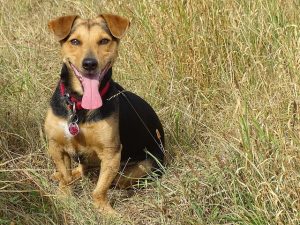I am telling you, people, being a dog-parent is no small task. When taking care of that little mutt, every small detail can become a cause for concern.
One quirk that used to bug me a lot is dogs sneezing when playing outside alone or with other dogs. From a human’s POV, the pattern felt weird, which worried me.
Dogs, often described as walking noses, have an extraordinary sense of smell, so they commonly sneeze more than humans. Sneezing while playing is very common and absolutely normal among dogs.
I know what you’re thinking, but why does it happen? Now, that’s a question which perplexes many dog owners.
Generally, play sneezing is a typical dog behaviour used primarily for communication. Unlike humans, dogs talk through body language and behaviours. Sneezing is a way for them to convey to their human or animal playmates that it’s all in good fun – which helps dissipate tension.
If you’re interested in learning more about how dogs communicate, you should read up on meta-communication as explored by Gregory Bateson after reading this blog.
In other cases, however, it could be a reaction to dust or foreign particles tickling their sensitive noses. But there’s more to this endearing behaviour.
Finally, if the sneezing is excessive and paired with other symptoms, it might be a red flag. Don’t worry, we’ll discuss all that in detail. Let’s begin!
Why does my dog sneeze when playing?
As I mentioned earlier, play sneezing usually happens during or after playtime and is generally harmless among dogs. Sometimes, it’s quite endearing when they let out a hearty sneeze each time as if following a subconscious routine.
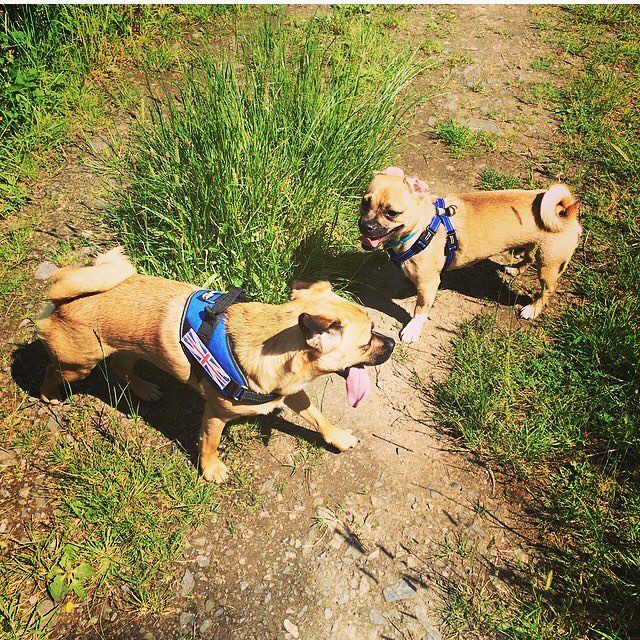
There are four main reasons for your dog’s play sneezing: it’s a method of communication, your doggo is unable to contain their excitement, something from the environment is tickling their nose, or they’re trying to get rid of excess energy.
1. Communication
Unlike us, dogs are adept at non-verbal communication. Think of this as sending a telegram in the old days, saying, “All is well, just having fun here, mate!”
Sometimes, it could invite others to join the merry romp or a bonding signal to solidify their friendly relationships. It’s a crucial gesture to maintain harmony during playtime.
Studies, such as those published in the Journal of Comparative Psychology, note that animal behaviours, including sneezing, are significant forms of communication.
2. Excitement
Dogs are simple creatures. They get excited by simple things such as your attention.
At times, they may get more excitement than their bodies could handle. This leads to rapid breathing, which further causes a tickling sensation in their sensitive noses and results in a big sneeze.
Like laughter for us during exciting conversations, a sneeze for dogs is a natural, cheerful expression amidst the fun.
3. Environmental Factors
The dust and particles that swirl in the air can often tickle their sensitive noses, which results in a quick sneeze to clear the way. Unless your dog has specific allergies, you shouldn’t worry about it.
4. Excess Energy
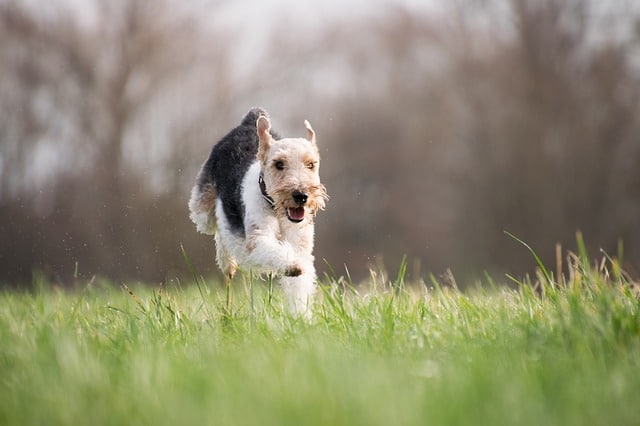
Dogs, especially those bubbly puppies, are literal bundles of energy. Sometimes, this boundless energy needs a vent to pass through.
During high-energy moments, your dog’s breathing rate increases, sometimes leading to a ticklish sensation in their nose. This tickle can trigger a hearty sneeze, clearing their nasal passages and expressing their excitement immediately.
It’s also a subtle cue for other dogs that the playful atmosphere is alive and well.
What other reasons do dogs sneeze for?
Dog sneezes aren’t always just for play. In fact, a sneeze can say a lot about what’s going on with your canine companion.
Here are some of the other reasons why your dog may be sneezing:
1. Attention-Seeking
You already know our dogs have mastered the “puppy eyes” when wanting a treat. But were you aware that a select few are even more clever?
Some crafty canines have realised that a well-timed sneeze can grab your attention, too! It’s cute, it’s clever, and it’s hard to ignore. They might sneeze here and there to ensure they’re the centre of your world.
In their defence, sneezing grabs your attention more positively than a bark or growl.
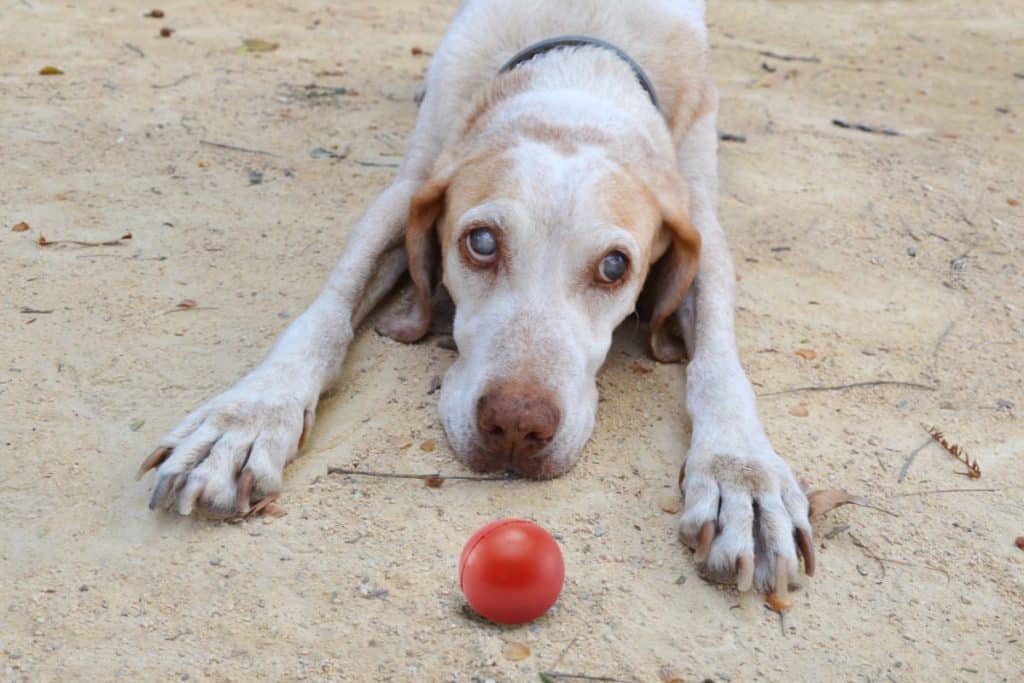
2. Allergies
Like us, dogs can be allergic to pollen, dust, mould, and certain foods. If you notice your dog sneezing frequently, it could be a sign that they’re encountering an allergen.
Alongside sneezing, other symptoms might include itchy, red skin or watery eyes.
3. Breed
Frequent sneezes are common among Brachycephalic breeds like Bulldogs and Pugs. Their shorter noses and flat faces make them prone to respiratory issues and sneezing.
4. Affection
While it’s not a direct display of affection like a lick or a cuddle, a sneeze during playtime can signal comfort and happiness in your presence. It’s their way of keeping the mood light and joyful, ensuring everyone knows it’s all in good fun.
When to worry about my dog’s sneeze?
Pay attention, pet parents!
Excessive and persistent sneezing among dogs is a cause for concern. Other worrisome signs include nosebleeds, a thick or coloured discharge from the nose, signs of pain like pawing at their nose, drowsiness, a high temperature, or breathing problems. Immediately consult your vet in these situations.
1. Excessive Frequency
It’s no biggie if your dog has sneezes here and there. But if they sneeze repeatedly, it might be more than excitement or a tickle.
Consistent sneezing could indicate an underlying allergy, irritation, or respiratory issue. Immediately consult your veterinarian for advice.
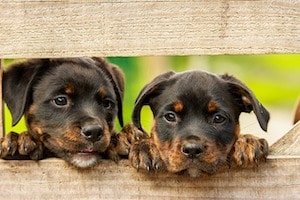
2. Reverse Sneezes
Reverse sneezing is a sudden, repeated inhalation through the nose and is more common in tiny titans like Terriers. When monitored, it often resembles a spasm instead of a sneeze. And sounds like honking or snorting.
Though it can be startling, it’s usually harmless. But continuous reverse sneezing warrants a vet visit just to be sure.
3. Deep Sneezes and Kennel Cough
Deep sneezes could be a symptom of kennel cough, a contagious respiratory disease. If your dog’s sneeze sounds more like a persistent hack or showing other signs of illness, it’s vet time.
Early diagnosis and treatment are crucial for keeping your dog healthy and happy.
4. Hunting Dogs
Hunting dogs, with their adventurous snouts, often get foreign objects and irritants stuck in their nasal passages. Check for obstructions if your doggo is sneezing unusually.
How to differentiate playtime sneeze from others?
| Aspect | Playtime Sneeze | Other Sneeze |
| Frequency | Occasional, mainly during or after play | Persistent and frequent |
| Body Language | Relaxed, loose body movements, possible play bow | Stiff body posture, possible signs of discomfort or stress |
| Accompanying Signs | No other symptoms | Coughing, nasal discharge, lethargy, or other symptoms |
| Context | Happens in a clear, playful situation with other dogs or humans | Occurs out of context, not related to play or excitement |
1. Body Language
Your dog’s body language and behaviour will be much more relaxed if it’s just a harmless playtime sneeze.
Observing signs such as loose movements and jumping can reassure you that the sneeze is just part of the fun. If you notice a high and wagging tail, those are additional signs of a happy, playful dog.
2. Frequency
A sporadic sneeze during interactive sessions isn’t a cause for concern. It’s their way of communicating through a meta language. However, it’s time to take note and discuss with your vet if the sneezing becomes excessive.
3. Accompanying Signs
A playtime sneeze is usually solitary, with no other accompanying symptoms. In comparison, it’s essential to consult with a vet if it’s with symptoms like coughing, nasal discharge, or lethargy.
Frequently Asked Questions (FAQ)
1. Can sneezing in dogs be a sign of a health issue?
Generally, excessive and uncontrollable sneezing in dogs can indicate health concerns. While many are harmless, persistent or severe sneezing can signal allergies, respiratory issues, or other health problems. It’s especially concerning if they’re accompanied by nasal discharges or nosebleeds.
2. Why do my dogs fight when I sneeze?
If your dogs start fighting when you sneeze, it might be a reaction to the sudden, loud noise and the break in their peaceful environment. Dogs can be sensitive to abrupt changes in their surroundings. In this case, your sneeze is interpreted as a stress or alarm signal.
3. Do dogs sneeze as a calming signal?
Dogs can indeed use sneezing as a calming signal. Sneezing during play is often a peaceful message to other dogs in the doggy world. It’s a way of maintaining a fun and relaxed play atmosphere.
4. Why does my dog sneeze when playing with other dogs?
Dogs often sneeze when playing with other dogs as a form of communication. This act signals to the other dogs that their actions are just playful antics, not aggressive behaviour. It’s a way to keep the interaction light-hearted and non-threatening.
5. Why do dogs sneeze after you kiss them?
Dogs might sneeze after you kiss them as a reaction to the sensation or the excitement of your affection. It could also be their way of communicating with you. Like humans, dogs have individual preferences and boundaries, and a post-kiss sneeze might be their gentle way of acknowledgement.
Source: TheKennelClub.org and Akc.org
